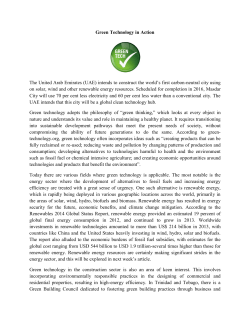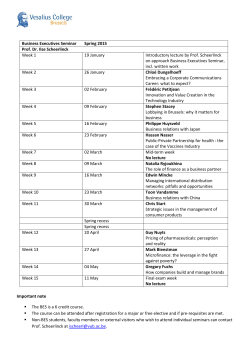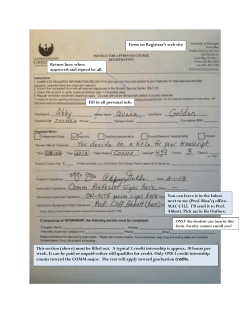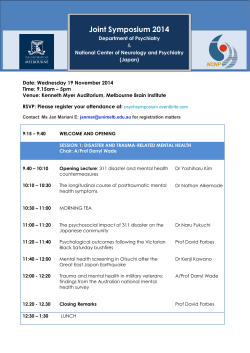
Bahrain 7th Seminar in Renewable Energy & Sustainable
Introduction by His Excellency Dr Abdul-Hussain Bin Ali Mirza, Minister of Energy The future of development and progress of any nation depends on maximizing its resources and using them in a wise and efficient way. Modern societies are energy intensive. This leads to sustainability questions, particularly, in terms of the supplementary to fossil fuel resources needed to meet the growing demand of energy. Renewable energy sources have provided answers to these questions. We have an abundance of solar energy in the region that needs to be cultivated and used. The feasibility of other renewable energy resources also need to be studied. Solar PV prices have gone down considerably in the recent years. This has made the potential for wide scale implementation of distributed PV power generation much stronger than ever. The potential for large scale power generation using concentrated solar energy is very high in the region. Research and development in parallel to commercial installations need to be accelerated as soon as possible. In the Kingdom of Bahrain, a 5 MW PV installation by BAPCO was completed recently in Awali, the refinery and the University of Bahrain. Another 5 MW pilot is being considered by the Electricity and Water Authority (EWA) using PV and wind turbines. The GCC countries have undertaken several projects. These projects will grow and continue and will change our future to more sustainable societies. Objective of the Seminar and Workshop Sustainable development is a pattern of resource use that aims to meet human needs while preserving the environment so that these needs can be met not only in the present, but also for generations to come. The term “sustainable development” emerged from the 1987 report of the UN’s World Commission on Environment and Development, entitled Our Common Future*. The commission was created to address growing concern “about the accelerating deterioration of the human environment and natural resources and the consequences of that deterioration for economic and social development.” In establishing the commission, the UN General Assembly recognized that environmental problems were global in nature and determined that it was in the common interest of all nations to invest in and establish policies for sustainable development. The field of sustainable development can be conceptually broken into three constituent parts: environmental, economic, and sociopolitical sustainability. In this seminar, the environmental sustainability will be discussed through discussing the contribution of sustainable and renewable energy towards a sustainable environment. Sustainable development and environmental sustainability will be first introduced. Then, components of sustainable and renewable energy will be thoroughly discussed. These components include: photovoltaic technology, solar thermal technology for heating and cooling, and wind technology. Other renewable energy technologies – such as wave power, geothermal power, tidal power, nuclear power, biofuels, and fuel cell – and energy efficiency improving technologies will also be briefly discussed. Ample time will be available for discussion and answering participants’ questions. *Our Common Future (1987), Oxford: Oxford University Press. Who Should Attend This seminar is aimed for management personnel, infrastructure and energy specialists, scientists, engineers, and senior technicians who work in industries/facilities that involves power generation. It superbly suits the industries/organizations that plan to invest in environmentally-friendly power generation technologies. It is also beneficial for personnel from the financing and banking sectors, venture capital and private equity houses, investors, and project developers. The Seminar Program Sunday 15 February 09:00 – 10:00 10:00 – 10:30 10:30 – 11:30 11:30 – 12:30 12:30 – 13:00 13:00 – 14:00 14:00 – 15:30 Opening Ceremony Coffee Break Renewable Energy is a reality in combating Climate Change Prof Ali Sayigh – Chairman of WREC & D G of WREN, UK Renewable Energy for Energy Security & Water Security – Panel Discussion Dr Fuad Al-Ansari, Dean of College of Engineering, UOB Adnan Fakhro, Deputy Chief Executive for Distribution & Customer Services Mr. Jassim Al Shirawi, General Manager Oil & Gas Affairs at National Oil & Gas Authority Prof Nader Al-Bastaki – Chemical Engineering Dept., UOB Prayers Break Photovoltaic Development & History Prof Lawrence Kazmerski – University of Colorado, Boulder, USA Lunch Break Monday 16 February 09:00 – 10:00 10:00 – 10:30 10:30 – 11:30 11:30 – 12:30 12:30 – 13:00 13:00 – 14:00 14:00 – 15:30 Buildings Design – Modern Approach – I Prof Marco Sala – Director of Abita, Florence University, Italy Coffee Break Examples from Vernacular Architecture Prof Marco Sala – Director of Abita, Florence University, Italy Fuel Cells and their applications Dr Shaker Haji, Head of Chemical Engineering Dept., Univer sity of Bahrain Prayers Break Bahrain Feed-in-Tariff (FIT) for the use of Renewable Energy Prof Ali Sayigh – Chairman of WREC & D G of WREN, UK Lunch Break Tuesday 17 February 09:00 – 10:00 10:00 – 10:30 10: 30 -11:30 11:30 – 12:30 12:30 – 13:00 13:00 – 14:00 14:00 – 15:30 Renewable Energy in the GCC Prof Waheeb Alnaser – VP for Academic Affairs & Postgraduate Studies, UOB. Coffee Break Progress in Photovoltaic Technology, Prof Lawrence Kazmerski Uni versity of Colorado, Boulder, USA BAPCO & Bahrain PV Project – 5 MW – Adnan Naji - Bapco Petra Solar Projects in the US – Prof. Issa Batarseh Prayers Break Renewable Energy Demand and Progress Marty Yousefiani - Casbian Renewable Energy Lunch Break Wednesday 18 February 09:00 – 11:30 11:30 – 13:00 13:00 – 13:30 14:00 – 15:30 Trip to Bapco & visit their PV Installation & visit the UOB PV Facilities Coffee &Prayers Break Certificate Presentations, and Closing Ceremony Lunch Break hosted by GPIC Keynote Speakers Professor Ali Sayigh: B Sc, DIC, Ph D, F I E, F I EE, C Eng. Professor Ali Sayigh is the Director General of World Renewable Energy Network (WREN) and the Chairman of World Renewable Energy Congress. He is also the Editor-in-Chief of Renewable Energy Journal incorporating Solar & Wind Technology, published by Elsevier Science Ltd, Oxford, UK. He is editor and editor-in-chief to additional 7 well known journals in Science, Engineering and Technology. He is the Founder and Chairman of the ARAB Section of ISES since 1979, was chairman of UK Solar Energy Society for 3-years and consultants to many national and international organizations. He was also the Head of Energy Department at Kuwait Institute for Scientific Research (KISR), an Expert in renewable energy at AOPEC. Since 1977, Prof Sayigh founded and directed several Renewable Energy Conferences and Workshops in over 25 countries. He started working in solar energy since 1969. Prof Sayigh taught ad supervised M.Sc. & Ph.D. students at many universities such as Baghdad University, King Saud University, Kuwait University, Reading University and University of Hertfordshire. He edited, contributed, and written more than 24-books, and 400-papers in various international journals and Conferences. Prof. Marco Sala Marco Sala is professor at the Department of Architectural Technology and Design of the University of Florence and Director of Marco Sala Associates, Architecture and Energy consultants. Prof. Marco Sala specializes in passive solar systems in architecture, environmental design and energy conscious building design. He is a teacher of Architectural Technology in the University of Florence and he is also Director of ABITA Interuniversity Research Centre based in Florence, Vice President of Eurosolar (The European Association for Solar Energy), consultant to Tuscany Region and Municipality of Florence. He has extensive experience in European research projects. Dr. Lawrence L. Kazmerski, Ph D Dr. Lawrence L. Kazmerski is the Director of Science and Technology Cooperation at The National Renewable Energy Laboratory (NREL). He was at (Electrical Engineering) of the University of Maine before coming to SERI (NREL) in 1977. His research at Maine included the report of the first thin-film copper-indiumdiselenide (CIS) solar cell. He was SERI’s first staff member in photovoltaics, hired specifically to establish efforts in the characterization of photovoltaic materials and devices; he led NREL efforts in measurements and characterization for more than 20 years. He has held adjunct professorships at the University of Colorado, Colorado School of Mines, and the University of Denver. Dr. Kazmerski has published over 300 journal papers and authored or edited four books, and currently serves on the editorial board of five journals—and he has more than 160 invited presentations at international conferences, workshops, and seminars. He was co-founder and editor of the journal SOLAR CELLS, published by ElsevierSequoia (1979-1991). Kazmerski is Editor-in-Chief of the Elsevier journal, Renewable and Sustainable Energy Reviews. He has three R&D 100 Awards. Kazmerski was the recipient of the Peter Mark Memorial Award of the AVS in 1981 and IEEE William R. Cherry Award in 1993. In 2008, Kazmerski was elected as a member of the National Academy of Engineering (NAE). General Information Course Date: Sunday 15th – Wednesday 18th February, 2015 Location: Crown Plaza -Bahrain Course Fee: BD 500 per participant, which includes tuition, supporting notes, lunches, and refreshments. Registration: To register, please fill in the attached registration form and send it to the address shown on the form. It is expected that private participants will pay the fee at their earliest convenience time prior to the first day of the course. Others are kindly requested to provide a sponsorship letter to this effect. Course Information: For technical information, please contact: Dr. Fuad Al-Ansari Dean, College of Engineering University of Bahrain E-mail: falnsari@uob.edu.bh Tel.: +973-17876601 (Off.) Fax: +973-17-684-844 P.O. Box: 32038, Isa Town, Bahrain Prof. Nader Al-Bastaki College of Engineering University of Bahrain E-mailnalbastaki@uob.edu.bh Tel.: +973-17876942 (Off.) Fax: +973-17-684-844 Dr. Shaker Haji College of Engineering University of Bahrain E-mail: shaji@uob.edu.bh Tel : +973-1787-6622 Tel.: +973-17680935 UNIVERSITY OF BAHRAIN College of Engineering Renewable Energy for Sustainable Development REGISTRATION FORM Please use a separate form for each registrant, photocopies are acceptable. Please print or type: Name: -------------------------------------------------------------------------------------Title: -------------------------------------------------------------------------------------Organization: -------------------------------------------------------------------------------Address: ------------------------------------------------------------------------------------------------------------------------------------------------------------------------------------Tel: --------------------------------------------- Fax: ---------------------------------------E-mail: --------------------------------------------------------------------------------------If you are sponsored, please fill in the following: Organization: -------------------------------------------------------------------------------Address: ------------------------------------------------------------------------------------------------------------------------------------------------------------------------------------For any enquiry, please contact: College of Engineering: Tel: +973-17876601/17876942/17876935 E-mail: nalbastaki@uob.edu.bh Printed at UoB Press-2015-0113177 Fax: 17684844
© Copyright 2025









